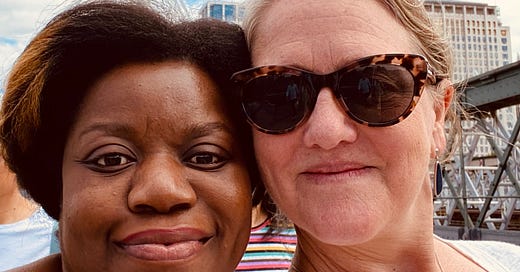"With Many Hands, the Work is Light"
Honoring Guerline Jozef for Black & Women's History Months, 2023
GUERLINE JOZEF is a human rights advocate and the Co-Founder & Executive Director of Haitian Bridge Alliance (HBA). A grassroots nonprofit community organization, HBA advocates for fair and humane immigration policies, especially as they impact Black migrants, the Haitian community, women and girls, LGBTQIA+ individuals, and survivors of torture.
Guerline is also making history — and she is on the right side of it. She lives by the motto: Anpil Men, Chay Pa Lou, which translated from Haitian Kreyol means, With Many Hands, the Work is Light. She is mothering a movement.
My sister in justice, Guerline’s story is featured in my forthcoming book, CROSSING THE LINE: FINDING AMERICA IN THE BORDERLANDS. I am proud to honor her on this day, which would still be Black History Month were it a leap year, but is the start of Women’s History Month, since it’s not.
Guerline is no stranger to life in the diaspora. She knows what it means to be torn suddenly from one’s roots by violence. She knows how it feels to be a family separated.
It happened on September 29, 1991. That day, Haiti’s first-ever democratically elected leader, Jean-Bertrand Aristide, was overthrown in a military coup. At that time, Guerline, her parents, and her younger brother were visiting relatives in New York. The military dictatorship was hunting down and arresting Aristide’s known supporters. Overnight, Guerline’s parents became targets for persecution. They couldn’t go back. But Guerline’s older siblings were still in Haiti.
Without warning, the Jozef family was torn asunder.
Fast forward 24 years…
Excerpted from
CROSSING THE LINE: FINDING AMERICA IN THE BORDERLANDS…
In March 2015, Guerline Jozef received a call from a stranger via Facebook Messenger. We have Haitians here at the border, the caller said. Since you are Haitian come take care of your people.
“I thought it was a joke. A prank. I’m like, what are you talking about? Haitians in San Ysidro? What kind of bullshit is that? We Haitians, we come by boat. We go to Florida. We don’t go to the US-Mexico border.”
She didn’t call back.
“Why do you suppose they called you?” I asked as we walked through Green Park en route to Buckingham Palace. Guerline was on her way home to Orange County, California, from Geneva, Switzerland, where she testified before the UN Committee on the Elimination of Racial Discrimination (CERD) about the anti-Black racism embedded in the US border-industrial complex. To my great honor, she scheduled a long layover in London so we might spend a day together. It was August 2022.
Seven years earlier, when Guerline received that fateful call, she was a talk radio host and program manager. She managed 10 shows, including her own, and produced fashion exhibitions highlighting the talents of up-and-coming Haitian designers, all while mothering a young child. She was already a burgeoning public figure, and not just as a promoter of Haitian culture, art, fashion, and music. She was the only Black person in her very white, politically conservative corner of the United States: the same place from which Harold Ezell and John Tanton championed their anti-immigrant Proposition 187 in 1994.
“I went three years without seeing another Black person!” Guerline exclaimed on describing what it was like to relocate to Orange County. The lack of diversity was sheer culture shock after growing up between Haiti and New York City. But Guerline’s heart expands to the size and breadth of any challenge. Even behind the Orange Curtain, the only Black person for miles, she developed a large and caring network of supporters and friends within her family’s church, school, and professional communities.
“Two weeks went by after I received that first call,” she states. “Then the person called again.” Haitians were pooling up just outside the McDonald’s in the Plaza at the Border Shopping Centre, the sprawl of outlet malls just next to PedWest, where Anastasio Hernandez Rojas was murdered in 2011.
“They have nothing. They don’t speak English. They need help. Could you please come?”
Guerline decided to go. It was just a 90-minute drive away, if there was no traffic. Or course, there’s always traffic in Southern California. The trip took two hours each way. But the call was not a prank.
“My mind was completely blown,” says Guerline.
There, at the McDonald’s on the Camino de la Plaza, Guerline found 12 Haitian men and women. They were destitute. Hungry. Exhausted. Stuck. They were also thrilled to encounter the first Haitian Kreyol speaker they’d met in years.
First things first: She asked them what they needed. A meal and a phone, was the reply. They were desperate to call the friends and relatives in the United States who’d been waiting to hear from them and were surely worried. They hadn’t been able to communicate since Customs and Border Protection officials took everything from them at the San Ysidro port of entry, they said. Now released from ICE detention, they had no way of securing the help of those prepared to get them plane tickets to homes of welcome in Miami or New York. Though granted legal entry to the US under humanitarian parole, ICE had dumped them at the McDonald’s without returning their passports, phones, and other belongings.
They weren’t even given a voucher for a cup of McDonald’s coffee.
“Here,” Guerline said, handing over her mobile. She watched it pass from person to person as she ordered Big Macs, Chicken McNuggets, Cokes, and fries. She sat with them as they ate, eventually working her way up to asking the question burning at the forefront of her mind: “What are you doing here? How did you get here?”




